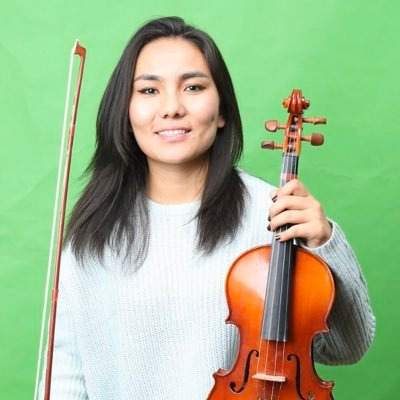In conversation with... Zarifa Adiba
Lydia Noon talks to the Afghan music conductor about changing attitudes and almost meeting Michelle Obama.

When did you start playing music?
I lived in Pakistan from when I was a year old until 2014. I always loved music but when I returned to Afghanistan, I decided that it was time to go for it. I spent hours trying to find a vocal teacher in Kabul until I heard about a music school – the only one in Afghanistan! The school’s director told me I wasn’t the right age to start but I begged him for a chance. Shortly after, I joined the school girls’ orchestra called Zohra, which means ‘star’.
What is life like for an 18-year-old woman in Afghanistan?
Living as a girl in Afghanistan is challenging. Some say that girls should stay at home, others say girls should do whatever they want to. It’s hard for a girl to go to school and work but things have improved since the early 2000s, when women didn’t have permission to show their face or use their voice. They had forgotten that they were human beings in the world. But now, the majority of girls are standing up and demanding their rights. The new generation shouldn’t face the same problems we are facing.
You recently performed with Zohra at the World Economic Forum in Davos, Switzerland...
It was so exciting for us. Not just because we were Afghanistan’s first all-female orchestra that were going to play there, in front of lots of people, but because it was an opportunity to show a beautiful side of Afghanistan to the world that has been hidden for 30 years. We also played in Geneva and Belgium and some of the audience came to us at the end, crying and saying thank you for showing them that good things are happening in Afghanistan.
The Taliban banned music – are there people who wish that was still the case?
The Taliban officially left Afghanistan in 2002 but they still exist in parts of the country. There are some people that have the Taliban point of view about the arts. At Zohra, we don’t blame those that say that music’s haram, because they grew up at a time when people told them that music is haram. I’m sure that people who are against music, girls’ education and girls learning music will change if the youth doesn’t give up and if we work for the betterment of Afghanistan, our culture and the arts.
Does your family support you?
I asked my step-father if I could go to Davos. He asked me lots of questions and I gave him answers that he couldn’t accept – until I told him that Michelle Obama was going to be there. He knows how much I love her so he convinced my mum that I should go. The day we performed, Michelle Obama wasn’t there but my father told me, ‘great job, I’m so proud of you’. My uncle has also told me that he is proud of me. But some of my relatives didn’t know that I was studying music until I went to Switzerland. They are annoyed by music and feel shame that a girl from the family would do something like this.
Do you hope to pursue music as a career?
I did want to be a musician, but I’ve realized that music doesn’t have the level of respect it deserves. When a singer makes a clip in Afghanistan, they have to pay for it and when they want their clip to be broadcast on TV, they have to pay again. They don’t earn any money. I spent two weeks at Yale university last year studying politics, economics and law. I learnt that musicians get paid because of something called copyright rule: we don’t have this in Afghanistan. Now I want to study law as my major and music business as my minor and I will try to bring copyright law to Afghanistan.
What do Afghan men your age think about Zohra and women’s involvement in public life?
The boys and the youth in Afghanistan are so open-minded and hungry for peace. We are working on a lot of projects together for ethnic diversities, girls’ education and promoting cycling. When we came back from Davos, they messaged us and said ‘well done, we are happy we know you’. I think this support is the first step towards peace and success in Afghanistan.
